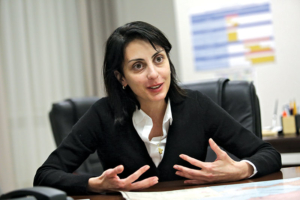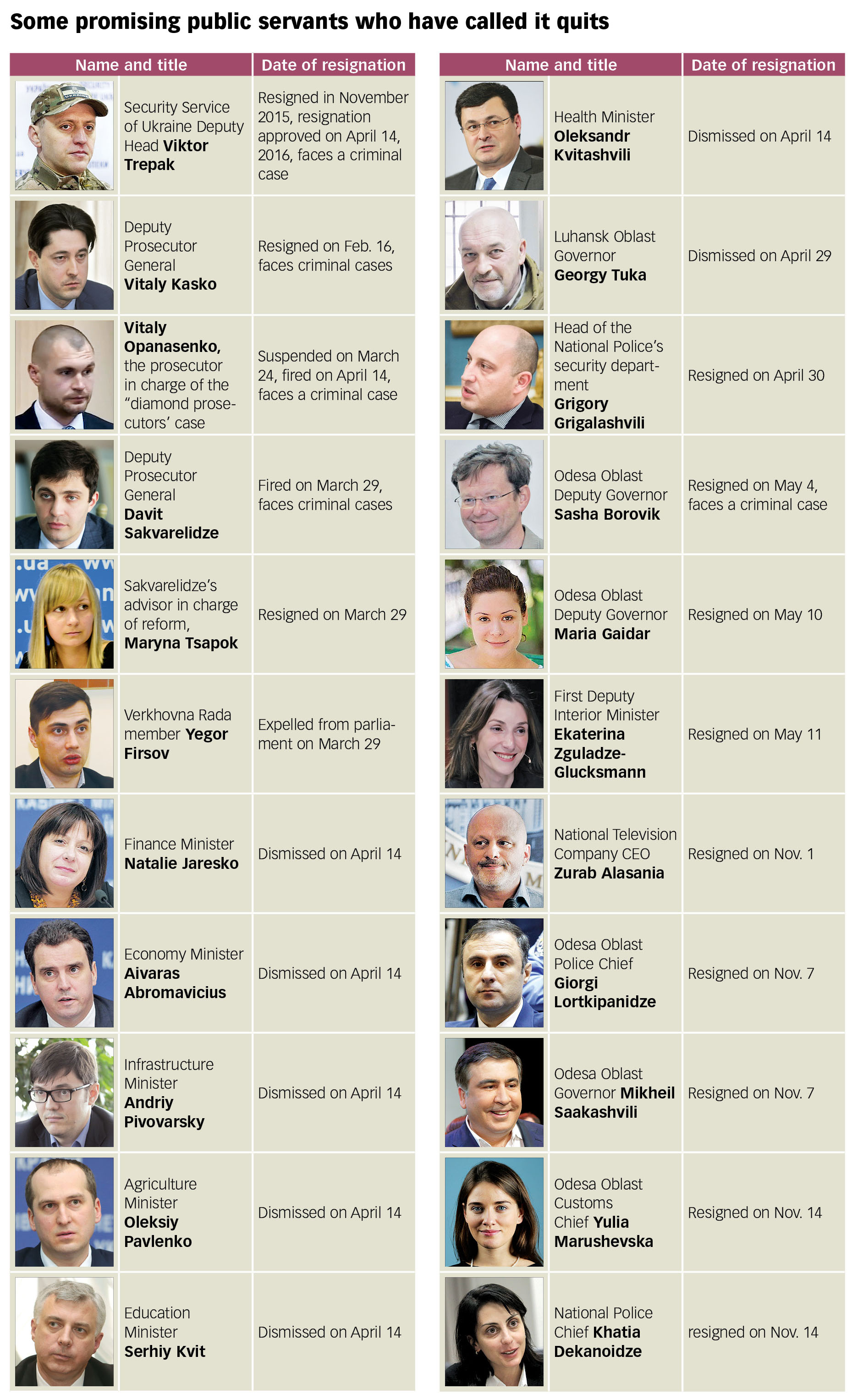More of Ukraine’s top reformers have quit government, complaining that President Petro Poroshenko’s administration is obstructing corruption fight
The exodus of top reformers from government, which began last year, is continuing.
While ex-Georgian President Mikheil Saakashvili stepped down as governor of Odesa Oblast on Nov. 7, his allies — National Police Chief Khatia Dekanoidze and Odesa Oblast Customs Chief Yulia Marushevska — quit a week later.
On the way out, they complain of sabotage of their efforts by President Petro Poroshenko and other Ukrainian leaders and the lack of political will to combat corruption and instill rule of law.
Poroshenko and his spokespeople, Sviatoslav Tsegolko and Andriy Zhigulin, have consistently refused to comment on the accusations.

Former National Police Chief Khatia Dekanoidze (Volodymyr Petrov)
Ivan Vinnyk, a lawmaker from the Poroshenko Bloc, the largest in parliament, denied the accusations of sabotage on Nov. 14, attributing the recent resignations to Saakashvili’s desire to enter Ukrainian politics.
Saakashvili is among those who quit who argue that the only remaining way for them to continue reforms is to get elected in opposition to Poroshenko and potentially come to power.
Saakashvili on Nov. 11 announced plans to create a new political force, push for early parliamentary elections and replace the current political establishment.
“I think the authorities have never wanted real reforms – those that would imply deoligarchization, changing society’s economic structure, getting rid of state property and total liberalization,” Sasha Borovik, who quit as a deputy of Saakashvili in May, told the Kyiv Post. “Those who left wanted to carry out deeper reforms that would change society but never got political support. Their exit made this clearer, and now reformist forces will have to win elections in order to implement reforms.”

Odesa Oblast Customs Chief Yulia Marushevska (Kostyantyn Chernichkin)
At least 22 top reformers quit government jobs earlier this year.
The most recent ones include National Television Company CEO Zurab Alasania, Odesa Oblast Police Chief Giorgi Lortkipanidze, First Deputy Interior Minister Ekaterina Zguladze-Glucksmann and Saakashvili’s deputies, Borovik and Maria Gaidar.
Some reformist officials still remain in the government, although their clout is diminishing due to the exodus of other reformers.
These include two Georgian-born Saakashvili allies – Deputy Justice Minister Gia Getsadze and Gizo Uglava, a deputy head of the National Anti-Corruption Bureau, as well as Finance Minister Oleksandr Danylyuk and Deputy Economy Minister Max Nefyodov.
Aborted reform
Dekanoidze, who became Ukraine’s first politically independent head of the police last year, has overseen efforts to oust corrupt police officers and recruit new staff in transparent competitions.
Dekanoidze was less outspoken in her resignation speech than other reformers and did not criticize Poroshenko and Interior Minister Arsen Avakov.
She listed her achievements but added that the ministry had “failed to root out corruption” and that she had not had enough authority to bring radical change.
Dekanoidze also said that one of the problems she had faced was political interference with the police and spoke out against the plans to replace her with her deputy Vadym Troyan, a loyalist of Avakov. But he became the acting chief of the National Police after her resignation.
Olga Khudetska, a journalist who used to be a member of a police vetting commission, told the Kyiv Post that Dekanoidze “appeared to be the only source of reform attempts. Avakov and his team were satisfied with the unreformed police. Dekanoidze was a factor that restricted (Avakov), though insufficiently.”
Even when Dekanoidze headed the police, Avakov had always kept real control over the police, and she was prevented from genuinely reforming it and ousting corrupt officials, Daria Kaleniuk, executive director of the Anti-Corruption Action Center, told Radio Liberty on Nov. 14.
The resignation of Dekanoidze in November and another Georgian-born reformer, Zguladze-Glucksmann, in May came as Avakov was accused of derailing the vetting of the police by protecting controversial officials accused of corruption and ousting civil society representatives from the vetting process. He denies the accusations.
Ironically, a job equivalent to Zguladze’s – that of a deputy interior minister – recently went to Anastasia Deyeva, a 24-year old Avakov aide with no apparent reformist credentials and an ex-assistant to lawmakers of ex-President Viktor Yanukovych’s Party of Regions.
“Dekanoidze likely quit because she realized her facade role and no longer wanted to play it,” Viktor Trepak, a reformer who stepped down as a deputy head of the Security Service of Ukraine last year, wrote on Facebook on Nov. 15. “…With Troyan appointed as acting head of the National Police, the minister received absolute control over the police.”

Ukraine has lost some of its most accomplished and promising reformers in recent months. Some remained silent about their reasons for quitting, others were forced out while still more complained about corruption.
Source: Kyiv Post research
Some observers, including ex-Batkyvshyna party lawmaker Andriy Senchenko, also attributed Dekanoidze’s move to what they see as her reluctance to participate in the government’s alleged plans to crack down on upcoming protests in the run-up to the third anniversary of the EuroMaidan Revolution on Nov. 21.
Another reformer, Marushevska, said on Nov. 14 that Poroshenko, Prime Minister Volodymyr Groysman and State Fiscal Service Chief Roman Nasirov had blocked her efforts to make customs clearance in Odesa more transparent and graft-free.
“We have exhausted all tools for carrying out reforms, and that’s why I’m resigning,” Marushevska said at a news briefing.
Nasirov, who has clashed with Marushevska and threatened to fire her, previously denied accusations of sabotage, while Groysman’s press office declined to comment.
Saakashvili, who is allied with both Marushevska and Dekanoidze, has recently stepped up his criticism of Poroshenko, accusing him of blocking reform and his associates of corruption.
“Just as with (ex-Georgian President Eduard) Shevardnadze, I’ve been severely disappointed with Mr. Poroshenko’s apparent inability to see that the status quo is unsustainable,” he wrote in a Nov. 16 op-ed for the New York Times. “Ukraine needs real change, not an imitation of it. Today, many of the reform initiatives we began have come to a halt. Just this week, Ms. Marushevska resigned from her post.”
Saakashvili also wrote on Facebook on Nov. 16 that Poroshenko had instructed his top allies and lawmakers Ihor Kononenko and Oleksandr Hranovsky to strip him of Ukrainian citizenship through a court.
“The reversal of reforms started in Ukraine several months ago,” Saakashvili, whose country was ranked as the world’s top reformer by the World Bank under his presidency, told Channel 112 on Nov. 14. “President Poroshenko has made a final decision to choose the path of enriching his own clan. After the Cabinet was replaced (in April), he started horsetrading with corrupt clans in parliament. As a result, there is no place for (reformers) in this corrupt swamp.”
